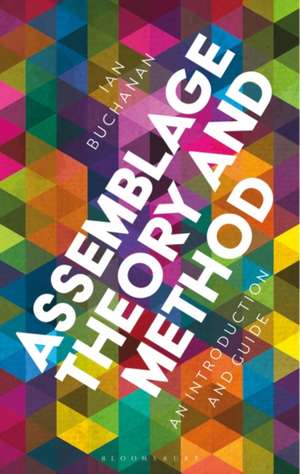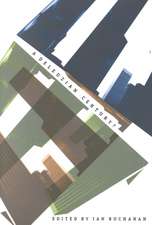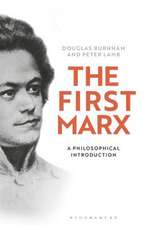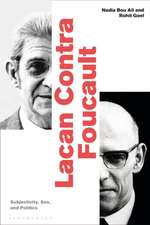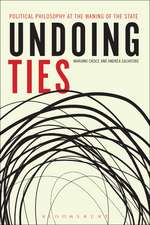Assemblage Theory and Method
Autor Ian Buchananen Limba Engleză Paperback – 2 sep 2020
| Toate formatele și edițiile | Preț | Express |
|---|---|---|
| Paperback (1) | 158.20 lei 3-5 săpt. | +25.58 lei 6-12 zile |
| Bloomsbury Publishing – 2 sep 2020 | 158.20 lei 3-5 săpt. | +25.58 lei 6-12 zile |
| Hardback (1) | 495.44 lei 6-8 săpt. | |
| Bloomsbury Publishing – 2 sep 2020 | 495.44 lei 6-8 săpt. |
Preț: 158.20 lei
Preț vechi: 172.58 lei
-8% Nou
Puncte Express: 237
Preț estimativ în valută:
30.27€ • 31.61$ • 25.05£
30.27€ • 31.61$ • 25.05£
Carte disponibilă
Livrare economică 14-28 martie
Livrare express 27 februarie-05 martie pentru 35.57 lei
Preluare comenzi: 021 569.72.76
Specificații
ISBN-13: 9781350015555
ISBN-10: 1350015555
Pagini: 192
Dimensiuni: 138 x 216 x 18 mm
Greutate: 0.26 kg
Editura: Bloomsbury Publishing
Colecția Bloomsbury Academic
Locul publicării:London, United Kingdom
ISBN-10: 1350015555
Pagini: 192
Dimensiuni: 138 x 216 x 18 mm
Greutate: 0.26 kg
Editura: Bloomsbury Publishing
Colecția Bloomsbury Academic
Locul publicării:London, United Kingdom
Caracteristici
The author, Ian Buchanan, is a globally recognised authority on Deleuze and contemporary theory more generally
Notă biografică
Ian Buchanan is Professor of Critical and Cultural Theory at the University of Wollongong, Australia. He is the author of A Dictionary of Critical Theory (2nd edition, 2018) and the founding editor of the international journal Deleuze and Guattari Studies.
Cuprins
PrefaceAcknowledgementsIntroductionChapter 1 The Problem of StrataChapter 2 Desire and MachinesChapter 3 TerritoryChapter 4 Expressive MaterialismChapter 5 Control AssemblageBibliographyIndex
Recenzii
In this manuscript Buchanan clarifies some of the most powerful, widely used and generally misunderstood concepts advanced by Deleuze and Guattari that comprise assemblage theory.
By carefully returning to their texts to excavate not only the concept of the assemblage but the related notions of stratification, desire, territorialization, the body without organs, the virtual and the actual, and more, Buchanan corrects many of the modish and often ad hoc appropriations of Deleuze and Guattari's work so often found in works of contemporary theory.
Ian Buchanan shows that the assemblage does not refer to things nor to an ensemble of parts, but rather to the constitution of life in chaos. As such, he reveals that the key to analysing new, ever more subtle, forms of social control is to repeat the tasks of schizoanalysis: mapping the intimate connection between stratification and desire in the configuration of territories that make both life, and its annihilation, possible.
Buchanan has succeeded in offering the clearest and most precise articulation of the concept of assemblage. Displaying an admirable ability to bring the abstract and theoretical to life through vivid, culturally relevant applications, this is a must read for anyone interested in returning to a conceptually rigorous understanding of assemblage that incorporates the full complexity of the term as Deleuze and Guattari intended.
Ian Buchanan's book succeeds in carving out the 'assemblage theory' of Deleuze and Guattari against suitors to the illegitimate uses of the concept. By calling into question the condition of the possibility of critical thinking itself, his ruthless and passionate intervention into the debate is the very way that Deleuze and Guattari do European philosophy. His rare achievement reaffirms the view that Deleuze and Guattari are now global thinkers and for everyone interested in the global theory of Deleuze and Guattari, this book proves to be an excellent resource in the 'minor' exercise of Deleuze and Guattari. You can resist it but do so at your own risk.
Assemblage Theory and Method ... [is an] excellent teaching tool that you can trust to give an erudite exposition of Deleuze and Guattari's writing.
By carefully returning to their texts to excavate not only the concept of the assemblage but the related notions of stratification, desire, territorialization, the body without organs, the virtual and the actual, and more, Buchanan corrects many of the modish and often ad hoc appropriations of Deleuze and Guattari's work so often found in works of contemporary theory.
Ian Buchanan shows that the assemblage does not refer to things nor to an ensemble of parts, but rather to the constitution of life in chaos. As such, he reveals that the key to analysing new, ever more subtle, forms of social control is to repeat the tasks of schizoanalysis: mapping the intimate connection between stratification and desire in the configuration of territories that make both life, and its annihilation, possible.
Buchanan has succeeded in offering the clearest and most precise articulation of the concept of assemblage. Displaying an admirable ability to bring the abstract and theoretical to life through vivid, culturally relevant applications, this is a must read for anyone interested in returning to a conceptually rigorous understanding of assemblage that incorporates the full complexity of the term as Deleuze and Guattari intended.
Ian Buchanan's book succeeds in carving out the 'assemblage theory' of Deleuze and Guattari against suitors to the illegitimate uses of the concept. By calling into question the condition of the possibility of critical thinking itself, his ruthless and passionate intervention into the debate is the very way that Deleuze and Guattari do European philosophy. His rare achievement reaffirms the view that Deleuze and Guattari are now global thinkers and for everyone interested in the global theory of Deleuze and Guattari, this book proves to be an excellent resource in the 'minor' exercise of Deleuze and Guattari. You can resist it but do so at your own risk.
Assemblage Theory and Method ... [is an] excellent teaching tool that you can trust to give an erudite exposition of Deleuze and Guattari's writing.
